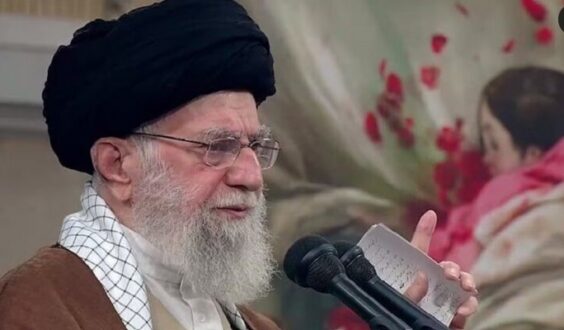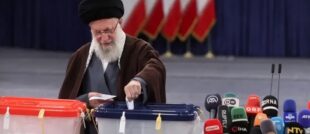Iranwire – The words of Iran’s Supreme Leader Ali Khamenei on the day of voting and the Saturday after the elections symbolize political developments and his view of the winner and vision for the next four years.
Some of Khamenei’s messages on the Saturday after the presidential elections, including in 2009, were more controversial and had a greater impact on the following years’ developments.
In 2009, despite calls to cancel the election and the start of street protests the day after the election, he sent a congratulatory message, effectively confirming the election results even before the Guardian Council’s review – a previously unprecedented action.
Khamenei did not repeat this move in subsequent elections.
In 2021, despite a record-low turnout, his message referring to the “epic and exciting presence” was also controversial.
On the voting day of the snap election on Friday, the leader of the Islamic Republic encouraged hesitant voters to participate.
“The durability of the Islamic Republic and the stability of the Islamic Republic and the honor of the Islamic Republic and the reputation of the Islamic Republic in the world depend on the presence of the people,” he said.
Khamenei’s words during voting in previous elections have often been a way of highlighting the atmosphere behind the scenes.
In 2009, he anticipated protests, stating, “Ill-wishers may want to cause violence in the voting centers, any violence will cost the ballot boxes. If someone wants to create such violence, people themselves should not let it happen.”
Despite widespread protests and the Guardian Council not officially confirming the election results, he called the “participation of more than 80 per cent of the people and 24 million votes for the elected president” a “real celebration” and asked supporters of other candidates to avoid “stimulating and suspicious behavior and speech.”
The leader of the Islamic Republic after the 2009 election said, “Saturday after the election should always be a day of kindness and tolerance.
“Whether the supporters of the elected candidate or the supporters of other respectable candidates, avoid any provocative and suspicious behavior and speech.
“The elected and respected president is the president of all the people of Iran, and everyone, including yesterday’s rivals, should support and help him.
“Undoubtedly, this is also a divine test in which success will be able to attract the mercy of Almighty God.”
He also thanked the Ministry of Interior and the Guardian Council for their “honesty and complete trustworthiness.”
Following the protests against Khamenei’s message in 2009, fundamentalist media noted that in previous periods he had also sent congratulatory messages the day after the election.
However, they were not comparable to the 2009 election.
In 1997, Ali Akbar Natiq Nouri himself congratulated Mohammad Khatami, and in 2005, despite strong criticisms from Mahdi Karroubi and Akbar Hashemi Rafsanjani, there was no call to cancel the election.
Khamenei called the 1997 election a “historical epic” and urged Khatami’s supporters to “know their success to be the help and guidance of God, and to ask for God’s help in all areas of life in the future.”
After Khatami’s victory in 2001, Khamenei called on all supporters and political figures to “appreciate this divine blessing and to avoid everything that displeases God and the people.”
Following Ahmadinejad’s victory over Rafsanjani in 2005, Khamenei emphasized: “When the elections are over, excitement and inflammation must be replaced by sobriety, friendship, and cooperation.”
He advised all to show “capacity, patience, and knowledge,” stressing that “national unity and friendship and tolerance guarantee the country’s security and neutralize any conspiracy.”
Khamenei’s message after the 2021 elections was controversial due to his reference to the “epic and exciting presence” despite low voter turnout.
He praised the “eye-catching scenes of your gatherings in the polling centers across the country,” calling it a sign of determination and a hopeful heart.
However, the 2021 presidential election had a record-low participation rate, with invalid votes ranking second.
Tabnak news website noted the differences in Khamenei’s 2021 message, highlighting its brevity compared to previous messages.
Typically, he would name the elected person and provide advice, thanking other candidates. In 2021, the candidate’s name was not mentioned.
Before the 1997 elections, Khamenei’s messages about elections were more general, supporting the entire Islamic Republic system.
In 1989, he described the presidential election as a defeat for “slanderers and ill-wishers” who tried to demoralize the people through propaganda.
Khamenei’s election messages often echo his pre-election speeches.
On Tuesday, contrary to expectations, his address was brief but included key points about the candidates.
He criticized those “close to America” and emphasized using domestic capacities, indirectly addressing election-related issues.
These remarks, interpreted as criticisms of certain figures like Mohammad Javad Zarif, were not very clear and did not provoke a strong response.
Khamenei said, “Those who have their eyes outside the borders are not able to see and recognize important domestic capacities and naturally are not able to plan to use them.”
He added, “Anyone who is close to America and thinks that one cannot take a step without the grace of America, will not use the country’s capacities and will not manage well.
“A person who does not pay attention to the strategy of Sharia and religion will not be a good colleague.”
Although these words were interpreted as an attack on certain individuals, they were not very clear and did not receive a serious response.
Some considered it a reaction to the speeches and actions of Mohammad Javad Zarif during the election period.
 Shabtabnews In this dark night, I have lost my way – Arise from a corner, oh you the star of guidance.
Shabtabnews In this dark night, I have lost my way – Arise from a corner, oh you the star of guidance.



